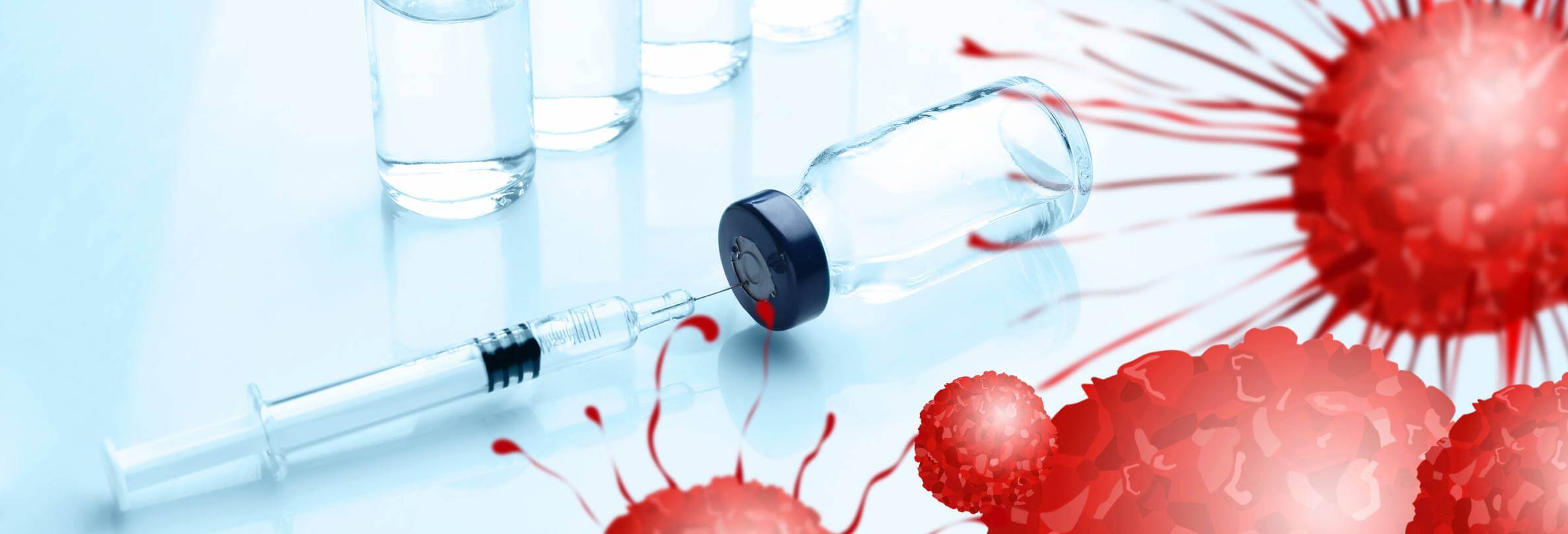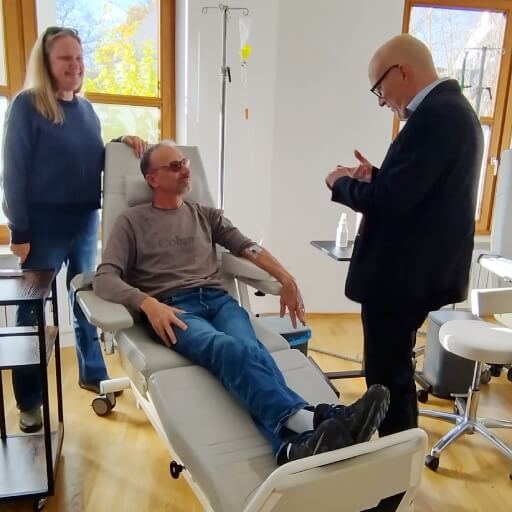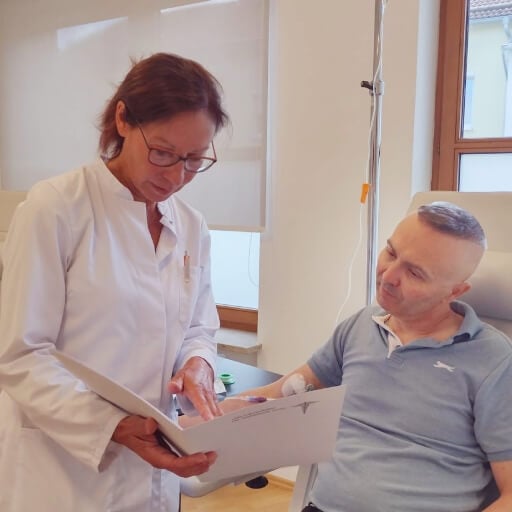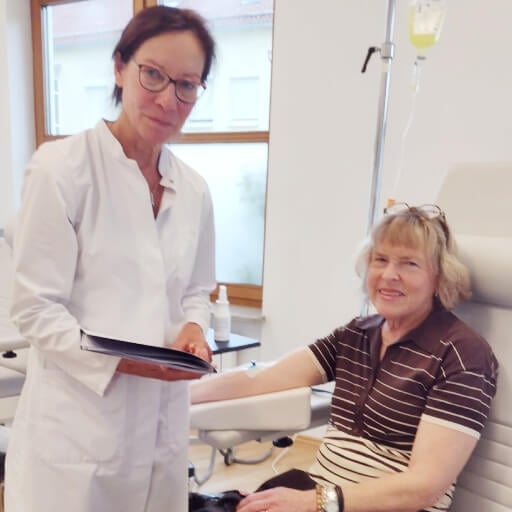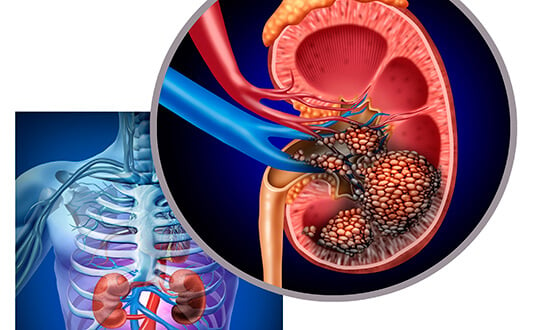Kidney cancer (KC) is a heterogeneous and complicated condition that is caused by the uncontrolled growth of abnormal kidney cells. Renal cell carcinoma (RCC) is one of the numerous types of cancer that comprise approximately 90% of all malignant kidney tumors. Kidney cancer (KC) has an increasing global prevalence rate of 400,000 new cases and a global mortality of approximately 175,000 deaths per year [1]. It is estimated that the incidence will keep rising in the coming decade, which is why it is so important to focus on dealing with this global health trend. Although there are general trends of rising incidences and deaths, sharp social inequalities are notable. The disease is more prevalent in low- and middle-income countries, with lower rates of survival and later disease diagnosis, and this shows the importance of socioeconomic factors in the prevalence and outcomes of the disease.
What Is Kidney Cancer?
Kidney cancer, or renal cell carcinoma (RCC), is a malignancy derived from the cells that line the tiny tubes of the kidney, the organs that filter waste and regulate fluid in the body. When the ordered cycle of cell growth and death is disrupted, abnormal cells begin to multiply uncontrollably, forming a tumor. Over time, these abnormal cells can invade adjacent tissue, and some of them may migrate through the body to distant parts, producing metastatic kidney cancer or metastatic renal cell carcinoma (metastatic RCC). The majority of kidney cancers are renal cell carcinomas that arise from the proximal renal tubules. Several less common cancer types that may arise in the kidney are transitional cell carcinoma, Wilms' tumor (seen rather frequently in children), and sarcomatoid carcinoma. Most of the patients found to have kidney cancer in the early stages of the disease may be successfully treated with surgical procedures. However, a majority of patients have their diagnosis made at a time when they are far advanced, and the systemic therapy and immunotherapy of kidney cancer assume an important role in the control of the disease.
How Kidney Cancer Develops
In healthy kidneys, billions of cells are constantly undergoing a cycle of growth, division, and death. However, within a short period of time, genetic changes affecting certain tumor suppressor genes, or oncogenes, disrupt this balance and lead to uncontrolled proliferation of kidney cells. These cancer cells acquire the ability to evade apoptosis, increase their angiogenic capabilities, and escape immune surveillance. Studies have shown that immune cells (for example, T-cells) have a dual role in the process. They are part of the immune system responsible for protecting the host, but they can also turn off their effector functions by expressing inhibitory molecules on their surface. This is one of the reasons why the immune checkpoint inhibitors have become mainstay therapies in the kidney cancer immunotherapy. They take the "foot off the brake" from the T-cells and give them the power to again recognize and eliminate malignant tumor cells.
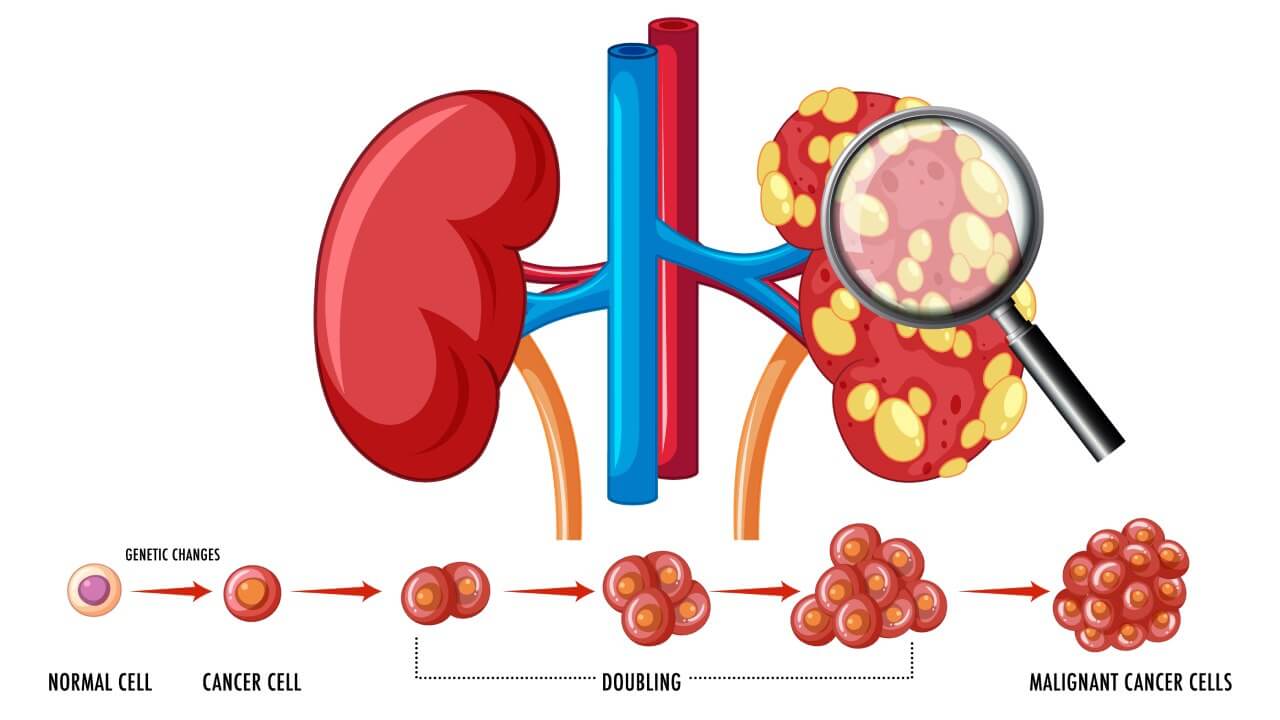
Kidney Cancer Types
Clear cell RCC is the most prevalent histological subtype seen in renal cell carcinoma patients. Сlear cell carcinoma accounts for approximately 70–80% of cases, and is usually associated with mutations in the VHL gene and a highly vascular component [2]. The other important histological variants include:
- Papillary cell RCC, which accounts for approximately 10–15% of renal cancers and is usually related to alterations in the MET pathway.
- Chromophobe renal cell carcinoma, which accounts for approximately 5% of the cases and has specific cytogenetic characteristics.
- Collecting duct carcinoma, which is a rare, aggressive, histological type of renal cell carcinoma that is usually diagnosed at an advanced or metastatic stage.
Each of these histological subtypes has specific differences with respect to histology, genetics, including response to immunotherapy or adjuvant treatment. Knowledge of these differences allows a better approach for oncologists in the selection of the appropriate first treatment to use and how to customize anti-tumor therapy for the particular patients, thereby optimizing treatment.
Risk Factors and Causes
The development of kidney cancer is influenced by various factors related to genetics, environment, and lifestyle. One of the most potent risk factors is smoking, since it doubles the risk of renal cell carcinoma by inducing DNA damage in renal cells. Overweight, high blood pressure, and chronic disease of the kidneys are also potent risk factors, since they show a close correlation with renal tumors [3].
Occupational exposure to toxic substances such as trichloroethylene, cadmium, certain herbicides, etc., has been linked with a high incidence of RCC. In addition, a family history of kidney cancer, especially in certain hereditary syndromes such as von Hippel-Lindau disease, Birt-Hogg-Dube syndrome, or hereditary papillary renal cell carcinoma, is an additional factor contributing to genetic susceptibility.
At the biological level, processes of chronic inflammation and oxidative stress in the renal tissues may induce molecular events, whereby malignant transformation may occur. Inadequate immune regulation may also lead to tumor development, since regulatory immune cells may not deal with abnormal neoplastic cells, hence may not adequately recognize and eradicate them. This close association between genetic predisposition and environmental stress factors provides compelling insights into the concept of renal cell carcinoma pathogenesis.
Types of Immunotherapy for Kidney Cancer Treatment
The evolution of kidney cancer immunotherapy has changed dramatically in the past 20 years. These agents were previously limited to simply giving cytokines. Today, there is a significant expansion in the category of cancer treatments that actually stimulate the immune system to recognize and destroy cancer cells. These therapies, as a group, will be the basis of the first-line treatment for advanced renal cell carcinoma in the future, with greatly improved survival as well as improvement in quality of life for patients.
Modern immunotherapy can be divided into several general areas, such as immune blockade, cytokine therapy, CAR T-cell therapy, dendritic cell vaccines, and combination therapy with supportive therapy or anti-cancer therapy. Each of these various techniques is specifically directed toward a different aspect of the immune response in order to provide tailored therapy in an individualized way to the various stages of renal cell cancer.
Cytokine Therapy
Before the advent of checkpoint inhibitors, cytokine-based therapy represented the earliest form of kidney cancer immunotherapy. Interleukin-2 (IL-2) and interferon-alpha (IFN-α) were the historically used agents to stimulate the immune system's innate capacity for cytotoxic activity [5]. High-dose IL-2 can activate cytotoxic T-cells and natural killer cells that can induce regression of the tumors in a small number of patients with metastatic disease. Unfortunately, these systemic therapies were associated with severe toxicity, including capillary leak syndrome and multi-organ failure, thus limiting their use to a select group of patients. These agents, although toxic, laid the groundwork for modern therapy of this disease, demonstrating that these immune cells could indeed eradicate cancer cells when stimulated properly. Cytokine therapy as a single agent is no longer used frequently today, but it is incorporated into some combination or adjuvant therapy protocols.
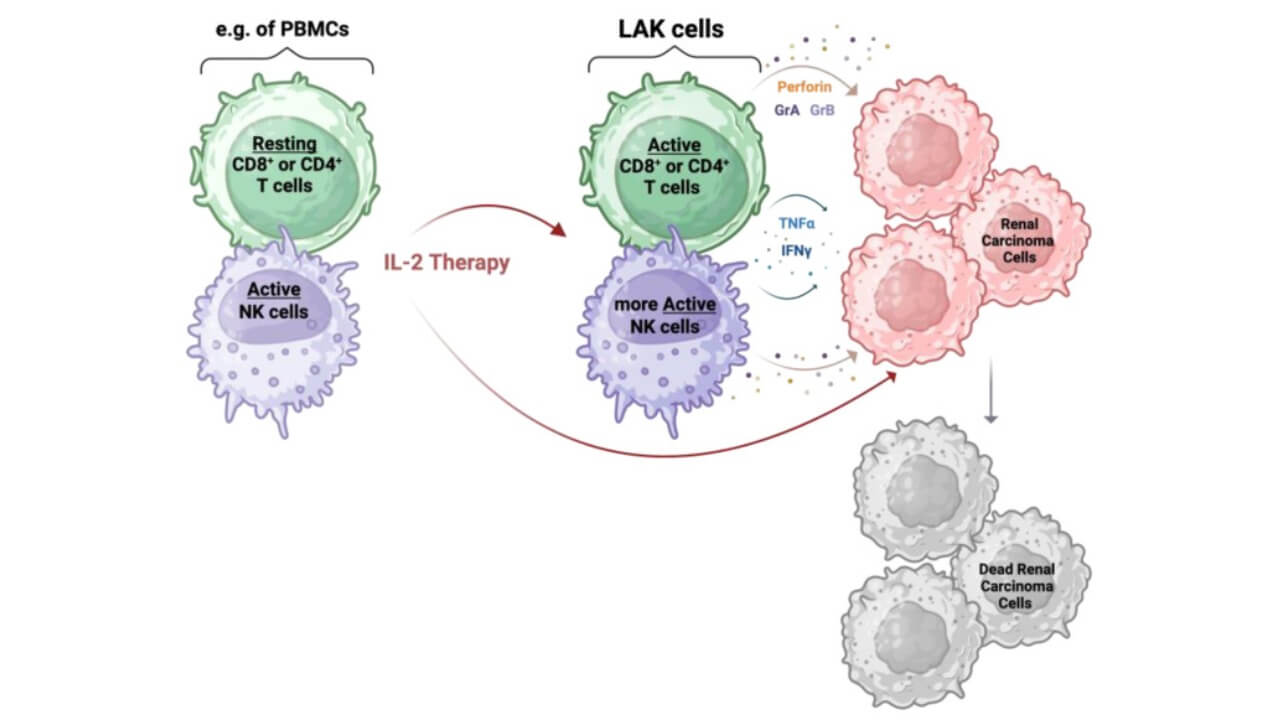
Immune Checkpoint Inhibitors
The introduction of immune checkpoint inhibitors (ICIs) is by far the most important advance in the immunotherapy of kidney cancer. These agents function by blocking negative signaling pathways that prevent T-cell attack against malignant tumor cells. In the normal state of the body, checkpoint molecules such as PD-1, PD-L1 and CTLA-4 function to prevent autoimmune injury to normal cells. However, these mechanisms are exploited by malignant cells in evading immune surveillance. Therefore, the inhibition of these pathways reactivates T-cell activity and enhances the immune response of the body against renal tumor cell proliferation [4]. Therapy with checkpoint blockade has been shown to produce prolonged responses for years, even though therapy has been discontinued. One reason for this is that there is a belief that not all patients undergoing treatment respond to it in the same way, and therefore, further research is aimed at discovering predictive biomarkers and optimizing treatment.
CAR T-Cell Therapy
An additional promising development is the Chimeric Antigen Receptor (CAR) T-cell therapy, which is a form of personalized cell therapy that reprograms T-cells of the patient to attack the tumor-specific antigens. The T-cells are obtained from the peripheral blood of the patient and manipulated in vitro to express chimeric antigen receptors (CARs). After that, they are infused back into the patient to destroy the tumor. This approach, while it has generated spectacular results in hematologic malignancies, remains difficult to apply to solid tumors such as renal cell carcinoma. Several factors impede its efficacious usage in renal tumors; namely, the tumor microenvironment, the antigen heterogeneity, and the immune suppression. However, the early trials are evaluating CAR constructs that are directed toward carbonic anhydrase IX (CAIX), which is frequently expressed in kidney cancer cells. The combination of CAR T-cell therapy with checkpoint inhibitors or targeted therapy may help deal with these problems in the future.
Dendritic Cell Therapy and Cancer Vaccines
Dendritic cell therapy is another type of immunotherapy for kidney cancer. Dendritic cells are special antigen-presenting cells that present antigen to the T-lymphocytes thereby activating the adaptive immune response. The fundamental role of dendritic cells in immunity, recognized with the Nobel Prize, forms the scientific basis for this approach. Dendritic cell therapy involves harvesting dendritic cells from patients, treating them in vitro with tumor-associated antigens and then reintroducing them into the body to induce an antitumor response.
Clinical studies have demonstrated that dendritic cell-based vaccines can induce measurable immune responses in patients with advanced or metastatic renal cell carcinoma and can significantly prolong survival. Such treatment is particularly well tolerated compared to systemic therapy and may be used as an adjunct to surgery to reduce the risk of recurrence. Research is also in progress to improve the selection of antigens, adjuvant formulations, and combination strategies to maximize efficacy.
Prof. Frank Gansauge explains in this short film how the dendritic cell therapy causes the patient's own immune cells to attack the tumor cells.
Combination of Immunotherapy and Targeted Therapy
Recent findings have demonstrated the synergistic effects of immunotherapy combined with targeted therapy for metastatic renal cell carcinoma. Targeted agents inhibit angiogenesis and block growth signals during tumor growth, while immune checkpoint inhibitors enhance immune recognition of tumor cells. At this stage, this new combination regimen has become the standard new anti-tumor therapy for patients with metastatic and advanced renal cell carcinoma, providing improved benefit in overall survival over older single-agent therapy regimens [6]. Lastly, combination therapy approaches may be extended to adjuvant therapy to help prevent recurrence of early-stage kidney cancer after negative margins have been achieved with surgery.
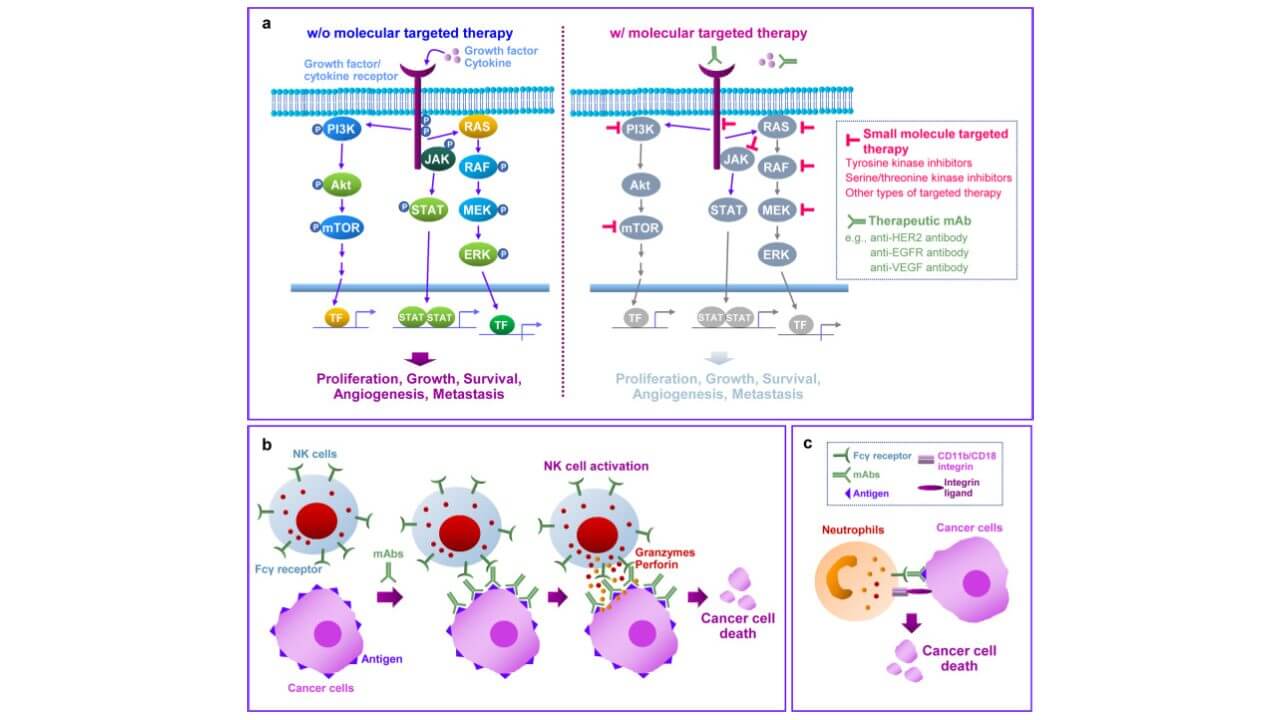
Benefits of Immunotherapy in Kidney Cancer Treatment
The introduction of immunotherapy for kidney cancer has changed the prognosis for patients with advanced or metastatic renal cell carcinoma. Whereas systemic therapy causes direct lethal effects on tumor cells by means of cytotoxic mechanisms, immunotherapy uses the patient’s immune system to recognize and kill the tumor cells. This shift from direct tumor cell killing to immune programming has resulted in an increased strength and duration of responses that frequently exceed the time of therapy considerably.
Durable and Long-Term Responses
One of the most motivating aspects of the immunotherapies used for kidney cancers is their ability to achieve long-term remission. Unlike targeted therapies, where, generally, the control of the disease is temporary, the immunotherapeutics for kidney tumors can provide disease control and, in some cases, complete responses that may last for years. The patients receiving checkpoint inhibitors have continued control of their disease long after the treatment has been stopped, signifying the long-term memory of activated T-cell lines. This so-called "immunologic memory" means that once the immune system recognizes the tumor as an alien, it continues to monitor and suppress the growth of the tumor, thereby decreasing the likelihood of recurrence. These persistent, durable effects are especially important in patients who previously had very limited expectations of long-term survival.
Improved Quality of Life and Lower Toxicity
Systemic therapy, e.g., classical chemotherapy, usually has side effects such as nausea, drowsiness, and bone marrow suppression. Immunotherapy generally has a much better side effect profile. Immune side effects (e.g., dermatitis, colitis, thyroiditis) can occur, but they are generally manageable and can be reversed when recognized early and correctly treated. In advanced renal cell carcinoma, the major consideration is the quality of life through therapy. Because immunotherapy works by attacking the immune checkpoints, the patients can remain active with a good appetite and a minimum amount of therapy interference. Many patients with metastatic disease report improved well-being, emotional stability, and hope for sustained disease control.
Broad Applicability Across Disease Stages
Another important advantage of immunotherapy is its versatility in the treatment of kidney cancer. Approved for the first time in metastatic RCC therapy, the immune checkpoint inhibitors are being examined as adjuvant therapy for the early stage of kidney cancer after surgical resection to prevent recurrence and eliminate microscopic residual disease. In advanced renal cell carcinoma, immunotherapy may also be utilized with first-line treatment and various approaches following failed targeted therapy. This versatility enables oncologists to individualize cancer therapy on the basis of tumor burden, molecular profile, and health of the patient. In addition, combination strategies that utilize immunotherapy together with anti tumor therapy have improved efficacy without significantly increasing toxicity, and provide more uniform outcomes in the advanced or metastatic cancer population.
Enhanced Survival and Disease Control
The clinical evidence clearly shows that immunotherapy for renal cell cancer has an impressive effect on survival benefit, this effect being greater than that seen with older forms of treatment. It is shown in landmark clinical studies that patients receiving targeted therapy show greater responses and longer survival than is seen in patients receiving standard forms of targeted therapy. Indeed, even in metastatic kidney cancer, partial and complete responses are being recorded, and some tumors are reported as resolving to a considerable degree or disappearing completely. Of great importance is that the time of these responses would indicate that once the immune system is reactivated, this would permit constant surveillance of tumor cells from the immune system and long-term control of the disease.
Expanding Treatment Options for Resistant Disease
Patients with diseases that were previously resistant to all forms of cancer therapy have also become treatable with the advent of immunotherapy. The flexibility of the immune system allows for the immune response to be endlessly modified and enhanced using a variety of new methods, such as CAR T-cell therapy and vaccine-based protocols. In patients with metastatic renal cell carcinoma who have become resistant to targeted agents, disease control can often be achieved again, and survival improved by changing to checkpoint blockade or utilizing the latter in conjunction with adjuvant therapy.
Psychological and Emotional Benefits
In addition to the biological impact, immunotherapy in renal cancers has a tremendous psychological impact. It makes the patient feel empowered in that the therapy works through nature's own defense mechanism rather than by injuring or destroying innocent tissue. For the majority of patients who have advanced renal cell carcinoma, the change in that attitude leads the patient into a different type of healing procedures, from a passive acceptance to an active participation in the cancer care. In retrospect, the development of immunotherapy for kidney cancer has not only extended life but also the dignity and hope of kidney cancer patients. Long remissions, the ability to lead an active daily life, and minimal possible side effects lead to overall victory, from both a medical and psychological perspective, in many different forms of cancer, such as kidney cancer.
| Stages of kidney cancer | Immunotherapy | Chemotherapy | Targeted therapy | Radiation therapy |
|---|---|---|---|---|
| Localized | 90% | – | – | – |
| Locally advanced | 85% | – | 60% | – |
| Metastatic | 70% | 20% | 50% | 30% |
*According to Booking Health data
Patient Story: Michael Thompson
Michael Thompson, a 62-year-old male from the United Kingdom, has been diagnosed with metastatic renal cell carcinoma that was found from routine imaging that revealed multiple lesions in the kidneys and lungs. The initial shock of finding out the news that there was progressive kidney cancer present was overwhelming, but the medical team in Germany was rapidly able to give him a specific plan of action. After surgical intervention had removed a major tumor mass from his left kidney, Michael began immunotherapy for kidney cancer.
The goal of this treatment was to stimulate the activity of his immune system, particularly his T-cells, so that they could recognize and destroy any remaining cancer cells throughout the body. Several months after starting treatment, follow-up imaging studies showed that the tumor tissue regression was impressive, and his oncologists detected a significant immune response against the metastatic kidney cancer. In addition to his systemic therapy, he was also given an adjunctive therapy to prevent recurrence of his illness.
For the next year, Michael continued this immunotherapy for the kidney cancer, which was continued with regular physical checks. He was concerned about the side effects of this therapy, but he experienced only minor fatigue and skin irritation, which were easily treated. The action of the therapy not only controlled the progressive renal cell carcinoma but also enabled him to maintain a high quality of life.
Today, Michael remains in remission, and there are now no detectable metastatic RCC. His case is an example of how immunotherapy for kidney cancer can give durable results for patients with metastatic and progressive renal cancer. The experience of Michael is a testimony to the beneficial effects of modern immunotherapy for kidney cancer, and gives promise for other patients with advanced renal cell carcinoma.
A Medical Journey: Every Step of the Way With Booking Health
Finding the best treatment strategy for your clinical situation is a challenging task. Being already exhausted from multiple treatment sessions, having consulted numerous specialists, and having tried various therapeutic interventions, you may be lost in all the information given by the doctors. In such a situation, it is easy to choose a first-hand option or to follow standardized therapeutic protocols with a long list of adverse effects instead of selecting highly specialized innovative treatment options.
To make an informed choice and get a personalized cancer management plan, which will be tailored to your specific clinical situation, consult medical experts at Booking Health. Being at the forefront of offering the latest medical innovations for already 12 years, Booking Health possesses solid expertise in creating complex management programs in each individual case. As a reputable company, Booking Health offers personalized treatment plans with direct clinic booking and full support at every stage, from organizational processes to assistance during treatment. We provide:
- Assessment and analysis of medical reports
- Development of the medical care program
- Selection of a suitable treatment location
- Preparation of medical documents and forwarding to a suitable clinic
- Preparatory consultations with clinicians for the development of medical care programs
- Expert advice during the hospital stay
- Follow-up care after the patient returns to their native country after completing the medical care program
- Taking care of formalities as part of the preparation for the medical care program
- Coordination and organization of the patient's stay in a foreign country
- Assistance with visas and tickets
- A personal coordinator and interpreter with 24/7 support
- Transparent budgeting with no hidden costs
Health is an invaluable aspect of our lives. Delegating management of something so fragile yet precious should be done only to experts with proven experience and a reputation. Booking Health is a trustworthy partner who assists you in pursuing stronger health and a better quality of life. Contact our medical consultant to learn more about the possibilities of personalized treatment with innovative methods and with leading specialists in this field.
International Cancer Care: Patient Stories with Booking Health
Frequently Asked Questions about Immunotherapy for Kidney Cancer
Send request for treatmentThe survival rates of kidney cancer patients who are treated with immunotherapy depend not only on the health of the patient and the clinical stage of the disease, but also on the type of immunotherapy used. In Germany, patients with advanced forms of renal cell carcinoma live longer than patients treated conventionally.
The necessary anti-cancer treatment is always tailored to the size of the tumor, the clinical stage, and the state of health of the patient. The routine treatment of localized cancer is surgery. Advanced and disseminated forms of the cancer require systemic measures with individual therapy plans.
The duration of the immunotherapy depends on the response of the patient and the side effects. In Germany, oncologists optimally arrange the therapy schedule and look after the side effects in such a way that the therapeutic effect of the immune treatment is maintained. Regular imaging procedures and laboratory tests assess the therapeutic effect of immunotherapy for kidney cancer.
The prognosis in case of kidney cancer is also different according to the clinical stage. The earlier the disease is discovered, the better the survival rates, whereas in the case of advanced metastatic cancer, the life expectancy of the patient is diminished. Individual therapy plans improve the prognosis in the long term.
In Germany, various possibilities of immunotherapy for kidney cancer are at the disposal of the patients. Besides the checkpoint inhibitors, there are also cytokine therapy and adoptive cell therapy elements. The doctor chooses the immunotherapy method best suited to the kind of tumor and the health of the patient.
Immunotherapy works in that the immune system is stimulated to see and destroy kidney cancer. The various therapeutic possibilities, such as the vaccines and the checkpoint inhibitors, result in a stimulation of the immune system activity.
The immunotherapy can, in sufficient measure, reduce the progression of the disease. The results of a German interventional study show that meaningful response rates can be obtained.
Yes, it can be combined with surgery, radiation, or targeted drugs. Combination immunotherapy for kidney cancer results in improved immune stimulation, but side effects need to be carefully monitored.
Booking Health support immunotherapy for kidney cancer in Germany helps patients access top centers. The team coordinates appointments, communicates with doctors, prepares medical documents, and provides personal coordinators throughout treatment.
Immunotherapy is highly effective across stages: approximately 90% for localized disease, 85% for locally advanced disease, and 70% for metastatic kidney cancer. These rates show how immune-based therapies can treat kidney cancer cells both locally and systemically, providing durable disease control.
Targeted therapy shows about 60% efficacy in locally advanced kidney cancer and 50% in metastatic stages. This highlights its important role in combination with immunotherapy to treat kidney cancer effectively and improve survival outcomes.
Chemotherapy and radiation therapy have limited effectiveness for metastatic kidney cancer, with response rates around 20% and 30%, respectively. Immunotherapy and targeted therapy are generally preferred for treating kidney cancer at advanced stages due to higher efficacy.
Choose treatment abroad and you will for sure get the best results!
Authors:
This article was edited by medical experts, board-certified doctors Dr. Nadezhda Ivanisova, and Dr. Bohdan Mykhalniuk. For the treatment of the conditions referred to in the article, you must consult a doctor; the information in the article is not intended for self-medication!
Our editorial policy, which details our commitment to accuracy and transparency, is available here. Click this link to review our policies.
Sources:
[1] Luigi Cirillo, Samantha Innocenti, Francesca Becherucci. Global epidemiology of kidney cancer. Nephrol Dial Transplant. 2024 May 31;39(6):920-928. doi: 10.1093/ndt/gfae036. [DOI] [PubMed]
[2] Ghislaine Scelo, Tricia L Larose. Epidemiology and Risk Factors for Kidney Cancer. J Clin Oncol. 2018 Oct 29;36(36):3574–3581. doi: 10.1200/JCO.2018.79.1905. [DOI] [PMC free article]
[3] Wong-Ho Chow, Linda M Dong, Susan S Devesa. Epidemiology and risk factors for kidney cancer. Nat Rev Urol. Author manuscript; available in PMC: 2010 Dec 30. Published in final edited form as: Nat Rev Urol. 2010 May;7(5):245–257. doi: 10.1038/nrurol.2010.46. [DOI] [PMC free article]
[4] Wenxin Xu, Michael B Atkins, David F McDermott. Checkpoint inhibitor immunotherapy in kidney cancer. Nat Rev Urol. 2020 Mar;17(3):137-150. doi: 10.1038/s41585-020-0282-3. Epub 2020 Feb 4. [DOI] [PubMed]
[5] Sophie Grigolo, Luis Filgueira. Immunotherapy of Clear-Cell Renal-Cell Carcinoma. Cancers (Basel). 2024 May 31;16(11):2092. doi: 10.3390/cancers16112092. [DOI] [PMC free article]
[6] Hye-Young Min, Ho-Young Lee. Molecular targeted therapy for anticancer treatment. Exp Mol Med. 2022 Oct 12;54(10):1670–1694. doi: 10.1038/s12276-022-00864-3. [DOI] [PMC free article]
Read:
Cancer immunotherapy in Germany
Article menu:
Don't know where to start?
Contact Booking Health